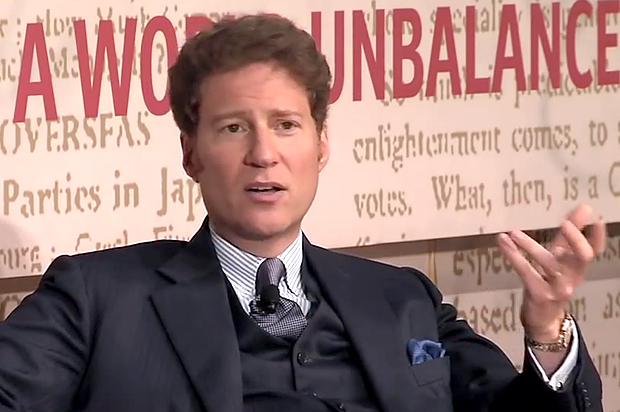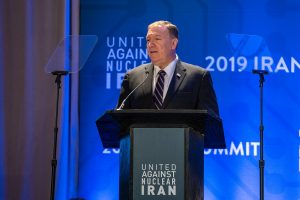by Jim Lobe
Along with AIPAC and the Foundation for Defense of Democracies (FDD), one of the most active groups that have promoted a policy of confrontation with Iran has been United Against Nuclear Iran (UANI), headed by a former Bush administration representative (under John Bolton) to the UN, Mark Wallace. According to a recent story in the New York Times, UANI, which has specialized in mounting public campaigns against foreign companies allegedly violating US or other sanctions against Iran, recently benefited from an intervention by the Justice Department in a defamation suit brought against the group by one of its targets, a Greek ship-owner, by asking the trial court to prevent the disclosure of the identity of its donors, as well as other internal UANI documents, arguing that such disclosure could jeopardize ongoing law-enforcement activities.
The intervention was highly unusual, according to some experts, as well as the trial judge himself, who nonetheless bowed to the government’s request.
The story piqued the interest of the intrepid LobeLog alumnus, Eli Clifton, who has uncovered some rather interesting facts about UANI in a piece he just published on Salon. The whole article is well worth reading, but its focus is the curious business relationship between Wallace and billionaire-philanthropist Thomas S. Kaplan, one of the world’s biggest investors in precious metals. As noted by Eli:
The nature of Kaplan’s ties to UANI aren’t entirely clear, but the links are apparent: Kaplan’s investment operations have shared several employees with UANI over the past six years, notably including UANI’s Wallace, who controls several mining ventures through the Tigris Financial Group with the billionaire. Together, the pair are betting big on investments in precious metals they say will retain or appreciate in value in an unstable economic and geopolitical environment. By Tigris’ own account, it stands to make money in the case of “political unrest in the Middle East” — exactly the kind of instability many experts think will become inevitable if naysayers of diplomacy with Iran have their way.
Wallace, according to UANI’s website, is CEO of the Tigris Financial Group, which happens to be controlled by Kaplan. Eli points out that both men have described the prospects for investors in silver, as bright, particularly given the possibility of global unrest, especially in the Middle East. He quotes a 2002 annual report for Kaplan’s Apex Silver Mines Ltd asking investors to consider “destabilization in the Middle East and Persian Gulf, tensions between India and Pakistan, the potential for nuclear confrontation with North Korea and Iran, […] religious extremism and terrorism on a global scale and hooliganism.” Similarly, in a 2011 prospectus for the Sunshine Silver Mine Corp. in Idaho, Tigris CEO Wallace noted that “investment demand for silver exposure remains strong” given “continued U.S. dollar weakness, ongoing economic uncertainty in Europe and political unrest in t he Middle East.”
Eli writes:
Though Kaplan isn’t listed anywhere on UANI’s public disclosures or on the gorup’s website, he acknowledged his connection to the anti-Iran group while receiving the French Legion of Honor insignia from French Ambassador Francois Delattre in April in New York.
“A friends’ comment that one day our kids might ask what our generation did when we knew what the Iranians’ intentions were prompted me to become part of something bigger,” he said, his words appearing only in a video recording of the event. “Hard to know what the outcome will be but I do know that as much as United Against Nuclear Iran may not have had Tomahawk missiles and aircraft carriers at its disposal, we’ve done more to bring Iran to heel than any other private sector initiative and most public ones.”
The published transcript of his remarks contained no mention of UANI or the comparison of the group’s work to advanced weaponry, presumably to be directed at Iran’s nuclear facilities.
Photo: Thomas S. Kaplan (Credit: YouTube/The Economist)






Nothing ego centrist about him, Kaplan, in answering the question from his children about what he did concerning Iran. Of course, nowhere will it be told that the civilian population paid the highest price in the quest for making a profit, or the suffering many others underwent in the process.